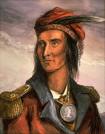
![]()
(1768-1813)
He spent much of his life attempting to unite Native Americans against United States expansion into the Mississippi River valley. Five times as a child he was forced to run from attacking settlers who burned his village, yet he grew into a generous, compassionate Shawnee leader. Admired by friends and enemies alike, he stood for simplicity, healthy living, honesty, reverence and brotherhood. He traveled thousands of miles making passionate speeches before dozens of tribes, pleading for unity. His dream of an independent Indian nation died with him in battle, but his lessons live on.
“Brothers, we all belong to one family; we are all children of the Great Spirit!” - Tecumseh
TECUMSEH
(By Jonathan Sprout & Dave Kinnoin)
Along the great Ohio
Where Shawnee people roam,
We hunt for what we need here,
And call this place our home.
Now, there is the white man,
And we don’t understand
Why treaties that he makes
Are promises he breaks
To rob us of our land.
REFRAIN:
We need Tecumseh ... brave warrior ... Indian chief
Tecumseh ... Tecumseh come to our relief
We must throw away our differences
And stand for what is right.
Tecumseh, help us to unite.
He stands before the Council --
A fire burning bright.
His wisdom lights the evening
Like embers in their flight.
He says “We must come together!”
With passion in his voice.
“Unite at any cost,
Or everything is lost.
We have no other choice!”
REFRAIN
BRIDGE:
All the Indian Nations
Can’t agree on what to do.
Will we have reservations
If we don’t listen?
If we don’t listen to....
REFRAIN
We must throw away our differences
And stand for what is right.
Tecumseh, help us to unite.
©2000 Kanukatunes & Songwizard Music
Tecumseh spoke out, trying to unite all Native Americans, attempting, in strength of numbers, to enact peace and equality with the encroaching White Man. He valued others and trusted others, though his life and people were, for the most part, not valued by white leaders. He asked for peaceful co-existence, mutual respect and appreciation.
Tecumseh was honest, knew and commanded respect, took responsibility for his fellow Indian tribes, showed compassion often even toward his enemies, had the perseverance to stand for his cause even until death.
One could think of Tecumseh as “the George Washington of the Indian Nations.” There are many similarities between the two heroes. Tecumseh attempted to unite his people against a common aggressor. (Washington attempted to unite his people, the colonists, against the British, who had been treating the colonists poorly.) When all other attempts at making peace failed, Tecumseh led his people into battle (as did Washington, becoming first in command of the Continental Army.) But whereas Washington won in his war with the British, Tecumseh lost in his war with the white settlers and the US government.
Tecumseh’s defeat, however, does not make him any less of a hero.
When the mistakes of the past are openly acknowledged, they are less likely to be repeated. It was a big mistake for the white race to nearly wipe out Native Americans. The life of Tecumseh demonstrates the difficulties of this struggle. In celebrating the life of this hero, we are valuing his and other Native American contributions, bringing awareness to the wrong doing of the Indian Wars, and, hopefully, ensuring that this kind of terrible treatment will not be repeated.
Native Americans and whites could have chosen to see each other as special and more interesting, rather than to see each other as wrong or bad, because they were different. Even in our day-to-day lives, instead of choosing to avoid those who do not look, act or talk like us, we could choose to learn from these people, so that we can have more experienced, open and deeper and richer lives.
I wish I could tell the story of Tecumseh as having happened that way -- that the white settlers came upon the Indians and relished in their differences, teaching each other the finer aspects of each other’s ways and thinking. I wish I could report that both groups of people were enriched by each other, that they both learned to live with each other in peace out of mutual respect. Indeed, it was sometimes the case that this happened, but by and large, Tecumseh, his tribe and his fellow Native Americans were wiped out for the very reason they could have been cherished -- they were different.
Links:




